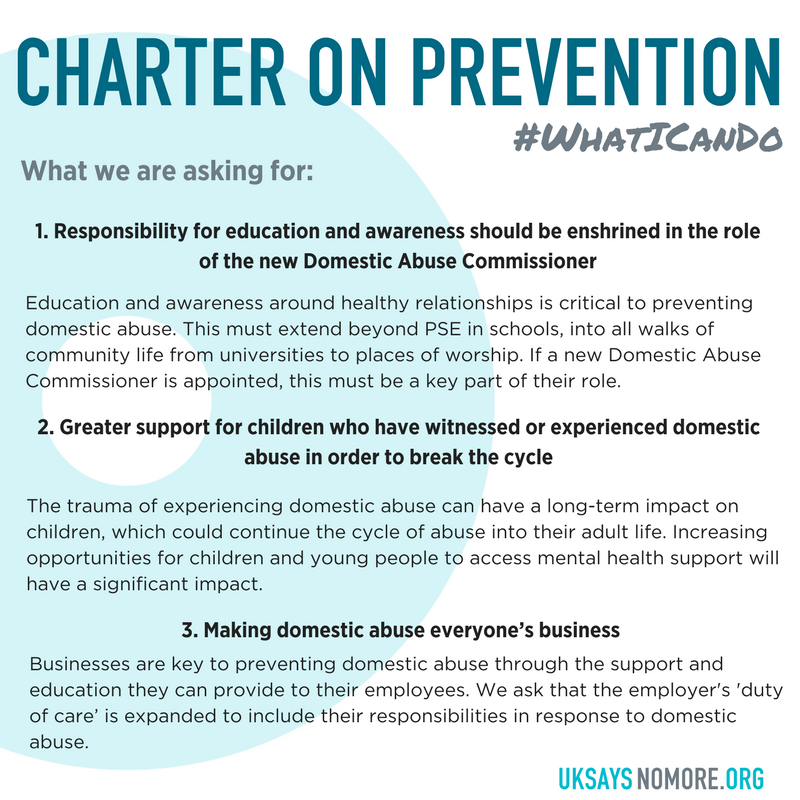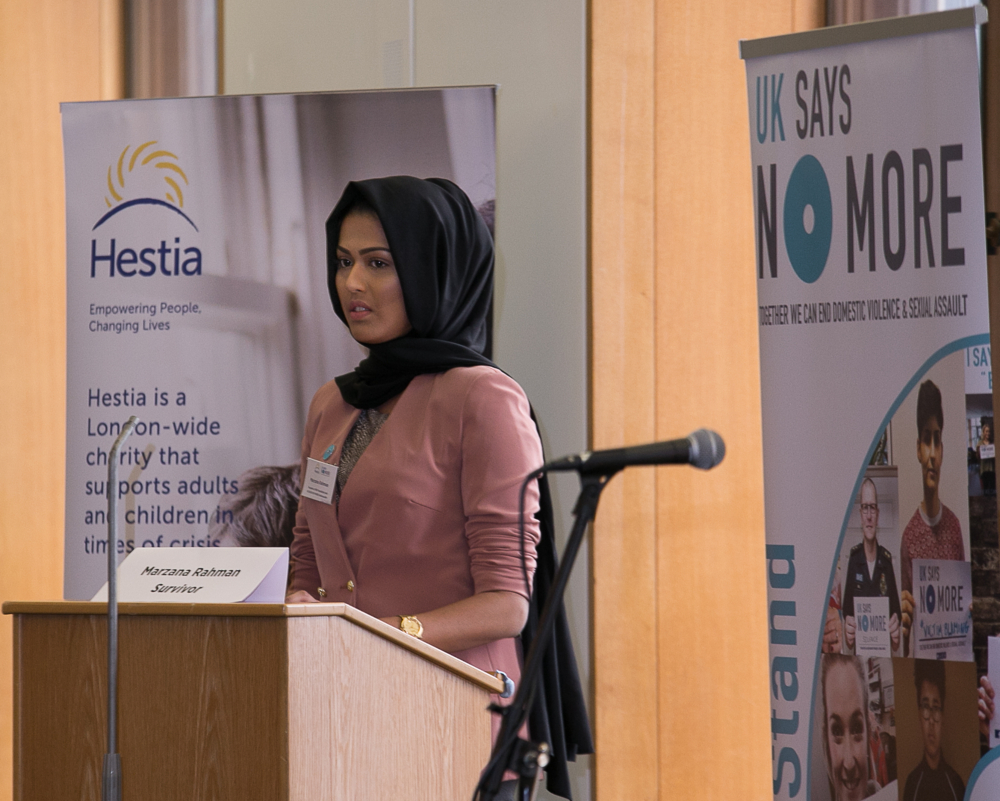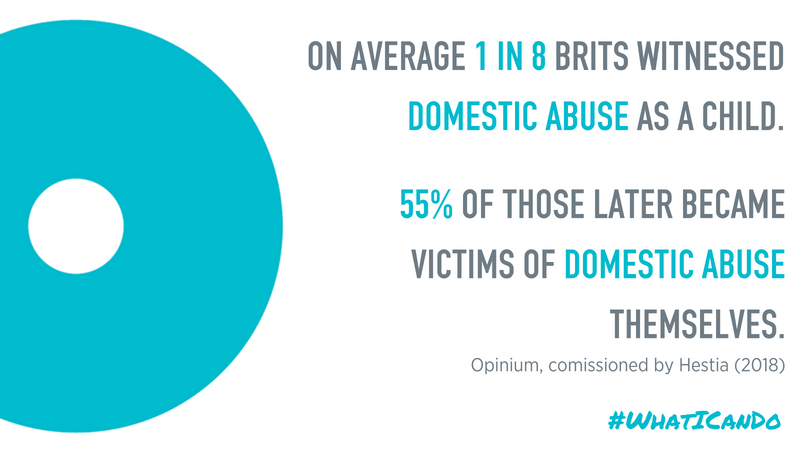UK SAYS NO MORE has been engaging parliamentarians on the issue of domestic abuse. Through working together we have been able to bring issues to light in both the House of Lords and the House of Commons. We have come a long way in contributing to and shaping the landmark Domestic Abuse Bill which serves to change the law so that it supports those who have experienced domestic abuse and brings the perpetrators to account. In 2018, we started asking Parliamentarians to back our Charter on Prevention which calls for key components of the Domestic Abuse Bill with a focus on prevention. Those who have backed our Charter on Prevention are one of our many Parliamentary Champions. Scroll down for more information on our Charter on Prevention and more updates on the Domestic Abuse Bill. Download our template letter to write to your MP and do your bit to make effective change. Not sure who your MP is? Find your MP here.
“We have to ensure that we stop the cycle of abuse, and education is the key. We must not shy away from discussing these issues.”
– Baroness Newlove, UK SAYS NO MORE champion.
What are we doing?
We want MPs to stand with us. We are absolutely delighted that now, 150 Parliamentarians in both Commons and Lords have pledged their commitment to ending sexual violence and domestic abuse by signing up to become UK SAYS NO MORE champions. We are inviting MPs to sign our Charter on Prevention, assisting us to shape the Government’s Domestic Abuse Bill and support our work providing tools and resources for individuals and organisations to take action and get involved in ending domestic abuse and sexual violence. We submitted written evidence as part of the Home Affairs Domestic Abuse Inquiry which you can read by clicking here. 
Domestic Abuse Bill Updates
MARCH 2020: The Domestic Abuse Bill re-introduced to Parliament
3rd March 2020 The Domestic Abuse Bill, in its draft from, is to be reintroduced to Parliament. Whilst we are pleased that the Bill was not lost despite a tumultuous period of politics over the last few months, we, like many others in the sector, know that the Bill can do so much more. The Domestic Abuse Bill is fundamental for the protection of victims and survivors across England and Wales and, as outlined in our Charter on Prevention (see above), we are aware that if not done well, opportunities can be lost to support all victims of domestic abuse including children and employees. In the past we have relentlessly campaigned for the recognition of children as victims of domestic abuse and so, we are pleased that on this day, a debate on children and domestic abuse has been brought forth. Whilst we look forward to these continued conversations, we will keep going and place much needed pressure on parliament to protect everyone who faces domestic abuse.
OCTOBER 2019 UPDATE: The Domestic Abuse Bill dropped
31 October 2019 On the day prior to UK SAYS NO MORE heading to parliament to deliver evidence on the Domestic Abuse Bill, we were told that the Bill would be halted in light of the upcoming General Election in December. Like many who have supported the Bill and have worked towards its fruition, this has been a huge let down. We will continue conversations with parliament to ensure that the voices of victims of domestic abuse are not forgotten. We ask our supporters and those of the domestic abuse Bill to speak to canvassers and ask them how they will be incorporating the domestic abuse bill in their party policies.
2nd October 2019 The Secretary of State for Justice, Robert Buckland MP, opened the debate on the Domestic Abuse Bill as it reached its second reading in Parliament. Responded to by Carolyn Harris, the Shadow Women and Equalities Minister, the debate proved lively with input across parties. Over 40 MPs wished to offer comments and contributions to the debate highlighting how the Bill remains at the heart of Parliamentary decision making and the importance it holds in guiding society response to Domestic Abuse.
Described by Buckland as a “landmark debate” putting survivors “front and centre.” The way society tackles domestic abuse strikes a chord across government including, but not limited to, the Departments of Justice, Education and Health. Carolyn Harris confirmed the importance of the Bill and the necessary support it gives to survivors of domestic abuse.
Rosie Duffield Canterbury MP, gave a moving speech on the complex picture of domestic abuse, telling the room that the way domestic abuse is portrayed in the media is not the whole story. Speaking from her own experience, Rosie gave a heartfelt account of the many sides of domestic abuse stating that “sometimes there are no bruises” and that domestic abuse can happen to anyone and, statistically could have happened to many MPs who were in the room with her. Her account brought silence in a room initially charged with interjections and enthusiasm to be heard. She reminded all those present and watching that the Bill is for survivors, for colleagues, family or friends who may have experienced domestic abuse first hand. She ended on an expression of #WhatICanDo to support those in need.
But one day you notice that you’re smiling, that it’s okay to laugh, and that it’s been a week or two since the daily sobbing stopped. You realise you are allowed to be happy. You dare to relax and you dare to start to feel free
So if anyone is watching and needs a friend, please reach out, if it is safe to do so, and please talk to any of us, because we will be there and we will hold your hand.
– Rosie Duffield MP
JULY 2019 UPDATE: The Domestic Abuse Bill is introduced to Parliament
16th July 2019 Following commitment from the Prime Minister, the Domestic Abuse Bill was introduced today in Parliament by the Under Secretary of State at the Home Office, Victoria Atkins MP, who has been highly active throughout the Bill’s life cycle. A result of extensive cross party scrutiny and public consultation, including evidence from Lyndsey Dearlove, Head of UK SAYS NO MORE, the Bill is considered to be monumental in changing the lives of victims and bringing perpetrators to account with the understanding of coercive control at it’s heart. Whilst we recognise how we have come, we understand that there is more work to be done to ensure that no-one gets left behind. What’s next?
- The Bill will undergo 5 stages both in the House of Commons and the House of Lords. As the Domestic Abuse Bill was brought to the House of Commons, it will start in the House of Commons first.
- First Stage: First reading in the House of Commons which does not include a debate. The Bill is published as a paper in the House of Commons for the first time
- Second Stage: Second reading involves a debate and is the first opportunity for MPs to discuss the main elements of the Bill
- Third Stage: Committee Stage where the Bill is examined in detail, line by line
- Fourth Stage: Report Stage, giving the whole House the opportunity to discuss and consider further amendments to the Bill
- Fifth Stage: Third reading, taking place straight after the Report Stage and is the final opportunity to debate the Bill. The Bill then goes to the House of Lords.
- The Bill will repeat a similar pattern to the stage above but in the House of Lords
- After the Bill has passed through both Houses it will undergo a Consideration of Amendments where the Bill goes back to the Commons to consider the Lord’s changes to the Bill, if any. The Bill will then bounce between the two houses until there is consensus.
- After the Bill has passed through all stages both in the Commons and in the Lords, the Bill must then have Royal Assent before it becomes an Act of Parliament
See the guide to how a bill becomes law
JUNE 2019 UPDATE: Promises made for children and the Domestic Abuse Bill
17th June 2019
Education secretary Damian Hinds announced his proposed amendments to the school admissions code that would ensure that children fleeing domestic abuse have faster access to school places. UK SAYS NO MORE welcomes this announcement following research by UK SAYS NO MORE, Hestia and Pro Bono Economics. The report reveals the personal cost of childhood exposure to domestic violence, including the difficulties of escaping violence and admitting children into schools in their new area. The announcement has been encouraging and we sincerely hope MP Hinds allocates support and funding to guarantee children’s access to vital services in order to break the cycle of abuse.
On a further note, our submitted recommendations to the pre-legislative committee for the Domestic Abuse Bill have been acknowledged through the identification of children as ‘victims’ of domestic abuse. This would further guarantee compliance with the Istanbul Convention clarifying that children may be victims of domestic abuse rather than mere witnesses. The recommendation will also be considered in the definition of harm in the Children’s Act. We eagerly welcome these recommendations and hope that the government will translate this into legislation.
Theresa May has committed to delivering the domestic abuse bill before she leaves office. This is promising news for survivors of domestic abuse and for those who have been campaigning this year to improve legislation. The Bill is expected to be introduced to the Commons on the 16 July.
Read the Draft Domestic Abuse Bill here.
Read the full Home Affairs Committee report here.
MARCH 2019 UPDATE: UK SAYS NO MORE gives evidence to the Pre-legislative committee on the draft domestic bill
UK SAYS NO MORE were asked to give evidence in Parliament in front of the Joint Committee on Domestic Abuse. Lyndsey Dearlove, the Head of UK SAYS NO MORE, reiterated our calls to action on what we want to see included on the Domestic Abuse Bill. You can watch the committee meeting here. Our calls to action asks to include special measures for children who have experienced domestic abuse which involves: – Child survivors are given special waiting list status (protected status) for all NHS services including Child and Adolescent Mental Health Support (CAMHS) – Children in refuges and those that have had to move due to domestic abuse have priority access to school places, with a duty on local authorities to respond to a change of school request from refuges within 20 days. The Joint Committee asked specifically whether we are surprised that children remain outside of the drafted legislation. The answer is we are surprised but will remain steadfast and focused on campaigning for their inclusion within the bill.
NOVEMBER 2018 UPDATE: UK SAYS NO MORE Recommendation Included In Home Affairs Committee Domestic Abuse Report – Statement
Read our written evidence here. In May, our Charter on Prevention called for MPs and parliamentarians to ensure the forthcoming Domestic Abuse Bill has a stronger focus on prevention. This includes better mental health support for children who have experienced domestic abuse in order to break the cycle, the new Domestic Abuse Commissioner ensuring education and awareness of domestic abuse is present in schools and beyond, and for all employers to acknowledge that ending domestic abuse is everyone’s business. You can read the full Charter on Prevention here. We’re pleased to see that part of the new Home Affairs Committee report on domestic abuse takes our recommendation on board, focusing specifically on the impact of domestic abuse on children. Our response asked for children who have experienced domestic abuse to receive protected status on NHS waiting lists, meaning that children who have had to move home or change schools for safety reasons will not have their opportunity to receive prompt medical care removed. It’s positive to see that this is being considered. In addition, it’s positive to see a change in language when it comes to children and domestic abuse. Currently, language used states that children ‘witness’ domestic abuse in the home, but this implies a detachment from the situation. Studies have consistently found that around 65-77% of households where women are subject to domestic abuse, children are also physically maltreated. And even still, if children aren’t abused themselves, the psychological impact of what they have been exposed to is profound and has a lasting, detrimental effect. We’re careful to always use the term ‘experience’ when talking about children and domestic abuse, as this is the hard-hitting reality. It’s good to see that the Home Affairs Committee has followed our use of language and recommendation to escalate the focus of domestic abuse and children, with the report also now using the term ‘experience’. With the forthcoming domestic abuse bill on the horizon, we hope to see more of our asks included, so we can stop domestic abuse before it starts. Read the full Home Affairs Committee report here. To culminate this engagement, we held a rally and call to action event at the Houses of Parliament during UK SAYS NO MORE Week, on Wednesday 23 May. MPs gathered in parliament during UK SAYS NO MORE Week to show their support for the campaign and rally action for a clearer focus on prevention in the Domestic Abuse Bill. At the rally, attendees heard from the Victim’s Comissioner Baroness Newlove and Carolyn Harris MP, alongside Marzana and Natasha, two survivors of abuse who are speaking about their own experiences in order to help raise awareness and put a focus on these issues. 
If I knew of the support and guidance that was available while I was suffering in silence, I most probably would have found the courage to leave my abuse partner a lot sooner than I did. Such organisations need as much exposure as possible as ultimately the only thing that can help a victim is to know that they are not alone and nor will the be demonised for speaking up. – Marzana Rahman, survivor and activist
Why are we doing this?
The British Crime Survey has found that 1 in 4 women and 1 in 7 men will be a victim of domestic abuse in their lifetime (ONS 2017). Domestic abuse accounts for 8% of all recorded crime within the United Kingdom. 950,000 children across the UK are affected by domestic abuse, either directly as victims of violence, or indirectly in terms of witnessing violence (BCS, 2009).
We welcome the Government’s Domestic Abuse Bill and see this as an amazing opportunity to come together and say NO MORE to domestic abuse and sexual violence – we can do more if we work together. Working with MPs will help ensure that this movement has a long lasting impact on the overall prevention message and strategy. The call comes as new data from Hestia, the largest provider of domestic abuse refuges in London, reveals that more than half (55%) of Brits who witness domestic abuse as a child will go on to be victims of domestic abuse in their adult life. The polling by Opinium highlights the stark need for more action to break the cycle of abuse.
Over a third of MPs (35%) report being made aware of a constituent having experienced domestic abuse within the last month, and a further one in five report having been made aware of this in the last week (20%) or 3 months (21%).
 In addition to signing our Charter on Prevention, we are asking MPs to download the Bright Sky app, which they can use with constituents to provide support to anyone experiencing domestic abuse. We are also inviting champions to sign up to domestic abuse and sexual violence awareness training, alongside visiting a domestic abuse refuge. From research carried out by Opinium (2018), it’s clear that MPs come into contact with domestic abuse in their professional and personal lives on a regular basis.
In addition to signing our Charter on Prevention, we are asking MPs to download the Bright Sky app, which they can use with constituents to provide support to anyone experiencing domestic abuse. We are also inviting champions to sign up to domestic abuse and sexual violence awareness training, alongside visiting a domestic abuse refuge. From research carried out by Opinium (2018), it’s clear that MPs come into contact with domestic abuse in their professional and personal lives on a regular basis.
3 in 4 MPs have dealt with a case of domestic abuse in the past 3 months. 1 in 4 have dealt with a case of domestic abuse in the last week.
Carolyn Harris MP for Swansea East and Shadow Minister for Women and Equalities said: “Domestic abuse has become a silent national health epidemic. It destroys people’s lives and children’s futures. I welcome the Domestic Abuse Bill but the Government can and must go further. I applaud the work of Hestia in taking forward UK SAYS NO MORE week to highlight the extent of domestic and sexual violence in this country. I stand with them and over 100 others in Parliament in calling on the Government to adopt this Charter for Prevention and collectively we are saying “No More”. Lyndsey Dearlove, Head of UK SAYS NO MORE at Hestia said: “1 in 4 women and 1 in 6 men will be a victim of domestic abuse or sexual violence in their lifetime. We can only end this by turning up the volume on the conversation and recognising that each of us has a role to play. We hope the support shown today from across the political spectrum will result in long-term measures that will bring an end to domestic abuse.”
Our written evidence for the Domestic Abuse Inquiry
You can read UK SAYS MORE’s written response to the Home Affairs Domestic Abuse Inquiry by clicking here.
Get Involved
If you want to become a MP Champion of UK SAYS NO MORE, or want more information about the campaign, please get in touch by emailing us at uksaysnomore@hestia.org.



